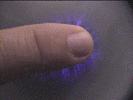ALCHEMY: Alchemy, 'the Royal Art', has always been a mixture of the scientific and the spiritual. Both the ancient Egyptian alchemists and their Renaissance descendants were actually chemists - and physicists, and astronomers, and mathematicians, physicians, botanists and biologists - all within the terms of their own day. Those who carelessly dismiss them as deluded or fraudulent magicians should remember that they were, in effect, the first scientists. They were the ones to discover that a polished lens of glass could focus the light of the Sun to a hot, burning point, or could magnify what is seen through it. They were the ones who studied physiology, and who worked out, sometimes rightly, sometimes wrongly, how the human body worked, and what the various parts of it were for. They were the ones who studied plants, and learned which were poisonous and which beneficial, and which lethal ones could, in tiny doses, heal.
If they also believed in the influence of the planets, and in the four elements, and in the humours, which cause modem scientists to smile condescendingly, such beliefs did not hold back their quest for scientific knowledge; indeed, there is plenty of evidence to show that they actually stimulated this pursuit of knowledge. If the alchemists used classification systems which today are seen as invalid, at least they were using classification systems - and, within their own terms, these worked.
In short, they studied the world within their current world-view, which is no different from what the great nineteenth-century chemists and physicists did, or what today's scientists do. A difference does exist, however, in that today's rigid professional stratification did not exist in medieval and Renaissance times, except in the craftsmen's guilds. Scientists then were also priests, monks, philosophers, poets, artists.
Two of the greatest teachers of the thirteenth century, Albertus Magnus (1193-1280) and Roger Bacon (1214-92) were both monks and scientists. Albertus was a Dominican who, despite his magical researches and his lifetime of studying Aristotle, rose to become a bishop. Bacon was a Franciscan, is credited with inventing eye-glasses and the 'scientific method' (i.e. personal observation of phenomena rather than simply accepting the received wisdom of authority), and spent the last fourteen years of his life in a dungeon for his supposed heresies. Depending on the source, both are credited with owning a speaking brazen head; Thomas Aquinas, who studied under Albertus, is said to have smashed the head because it disturbed his studies.
Another important name of the period is that of Ramon Lull (1232-1315), a Spanish philosopher who encountered both the Spanish Cabalists and the mystical Muslims of northern Spain. Lull drew together the teachings of the ninth-century Irish scholar John Scotus Erigena, the concept of the four elements (earth, water, fire and air) and their qualities (dry and cold, cold and moist, hot and dry, and hot and moist), the seven planets and twelve zodiacal signs of astrology, the three spheres (supercelestial, the realm of the angels; celestial, the realm of the stars; and material, the realm of man), the Jewish and Muslim emphasis on the Divine Names (or Attributes) of God, and much more besides, into one complex system known as Lullian Art, the basis of all arts and sciences, of philosophy and religion. He was also a proponent of the Art of Memory, or Theatre of Memory; his Ars Memoria was to be influential in the coming centuries. Alchemy was regarded with suspicion partly because it involved non-Christian ideas. |
|
One of the most influential early alchemists was the Arab mathematician Jabir ibn Hayyan, or Geber (c. 721-c. 815), whose texts were so shrouded in allegorical symbolism that he has bequeathed to us the word 'gibberish'.
The symbolism was used to mask the deeper meaning of the texts. Although the early alchemists were chemists, who laid down many of the foundations of later practical chemistry, alchemy was never just to do with turning base metals into gold; that was always symbolic language for deeper psychological, philosophical and spiritual truths as in turning the base spirit into an enlightened one. In a discussion on the meaning of initiation, the twentieth-century occultist Israel Regardie writes, 'The entire object of all magical and alchemical processes is the purification of the natural man, and by working upon his nature to extract the pure gold of spiritual attainment. This is initiation.' It is almost impossible to separate the physical and the spiritual in alchemical texts. Alchemists actually did spend years with their retorts and alembics; on one level the texts were genuine instruction manuals for their chemical experiments. On another, allegorical level, they gave instruction on the purification of the soul. And between these two, the physical and the spiritual, was the psychological level.In early religion, sex was seen as a potent force. With humans, as with all animals, sex gives birth to new life; with the Gods it must surely be the same. Sexual energy, and the sexual fluids, are life-giving, powerful, sacred.
Just as Pythagoras travelled around the Middle East and possibly the Far East in his search for knowledge, and eventually settled his school in a Greek community in Italy, other philosophers spent years in countries not their own, learning and studying, comparing and assimilating knowledge.
The study of comparative religion of the nineteenth and twentieth centuries is nothing new; 2,000 years ago or more, scholars around the Mediterranean - i.e. the whole civilized, cultured world - looked at their Gods and the Gods of their neighbours and drew comparisons. The Roman and Greek Gods were easy enough to match up, the Egyptian Gods a little less so, though when the Greeks ruled Egypt they were happy to identify Atum-Re, the Creator God, with their own Zeus.
Christianity spread into Egypt from its very beginning. Unlike the Greeks and Romans, the early Christians could not allow any other Gods under any other names; they could not accept that God the Father of Jesus could be identified with Zeus or Jove or Amun-Re as the One Creator God. In addition, the early Christians looked at the openly sexual nature of Egyptian mythology and were horrified. Origen, an Egyptian Christian, castrated himself in order to purify himself. The sinfulness, guilt and shame which Christianity has attached to sex from the time of the Church Fathers onwards quite possibly originated in an over-reaction against the religion of Egypt, and a determination to show itself to be different.
More...
 |




